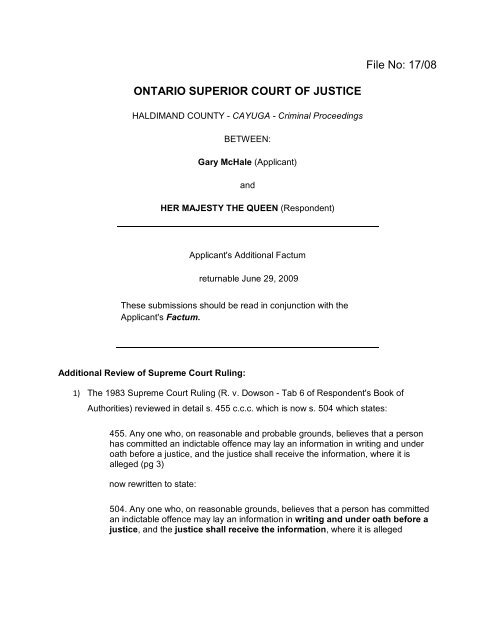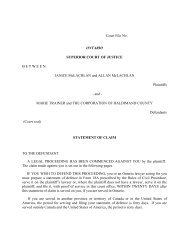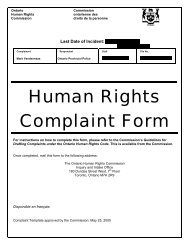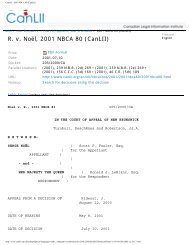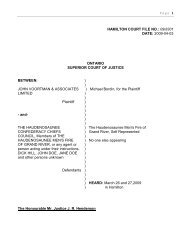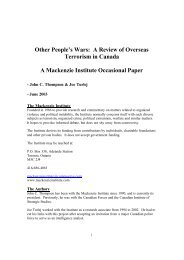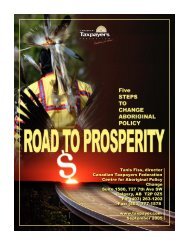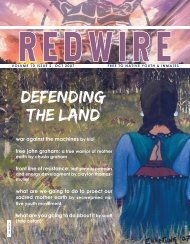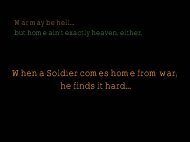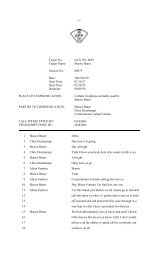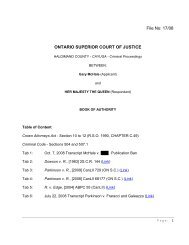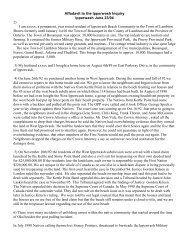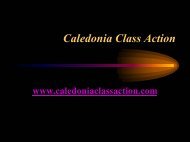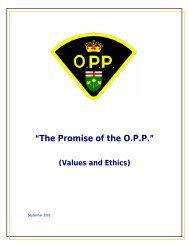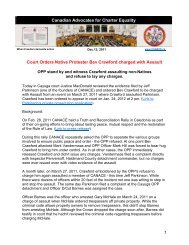Final Factum - Caledonia Wake Up Call
Final Factum - Caledonia Wake Up Call
Final Factum - Caledonia Wake Up Call
Create successful ePaper yourself
Turn your PDF publications into a flip-book with our unique Google optimized e-Paper software.
File No: 17/08ONTARIO SUPERIOR COURT OF JUSTICEHALDIMAND COUNTY - CAYUGA - Criminal ProceedingsBETWEEN:Gary McHale (Applicant)andHER MAJESTY THE QUEEN (Respondent)Applicant's Additional <strong>Factum</strong>returnable June 29, 2009These submissions should be read in conjunction with theApplicant's <strong>Factum</strong>.Additional Review of Supreme Court Ruling:1) The 1983 Supreme Court Ruling (R. v. Dowson - Tab 6 of Respondent's Book ofAuthorities) reviewed in detail s. 455 c.c.c. which is now s. 504 which states:455. Any one who, on reasonable and probable grounds, believes that a personhas committed an indictable offence may lay an information in writing and underoath before a justice, and the justice shall receive the information, where it isalleged (pg 3)now rewritten to state:504. Any one who, on reasonable grounds, believes that a person has committedan indictable offence may lay an information in writing and under oath before ajustice, and the justice shall receive the information, where it is alleged
a. The Supreme Court stated that 'the power to stay, while necessary, encroachesupon a citizen's fundamental and historical RIGHT to inform under oath a Justiceof the Peace of the commission of a crime". (pg. 2 para 3)i. This is still supported by the current wording of s. 504 which states theinformation is to be laid in 'writing and under oath before a justice'.ii. Furthermore, the word 'shall' is used stating, "the justice shall receive theinformation".2) Since the 1983 Ruling, Parliament has not changed the key wording of these sections ofthe Criminal Code. The only change is in s. 504 where it states 'on reasonable grounds'instead of the phrase 'reasonable and probable grounds' in the old s. 455.3) The Supreme Court considered the discretionary authority of the Crown under the old s.732.1 (power to stay proceedings) and their responsibility for the conduct of prosecutionfound in section 11-12 of The Crown Attorneys Act. (pg. 4 last para.)4) The discretionary authority contained within The Crown Attorneys Act didn't persuadethe Supreme Court in 1983 to overrule the Rights of a citizen to inform under oath.5) Provincial Acts cannot overrule the will of Parliament. In the annotations of s. 504 (2008copy) it states:"Constitutional considerations - This provision is intra vires Parliament, andprovincial provisions such as those contained in the Youth Protection Act, 1977(Que), c. 20, which attempt to prevent anyone from laying an information unlessthe person has consent of a government official are inoperative..."6) The Supreme Court ruled that the discretionary authority to stay (Intervene in aproceeding) should not overrule the Rights of a citizen without the clear text limiting thecitizen's rights. Parliament has not given any clear text that the Crown has authority towithdraw an information.7) The Crown doesn't offer a single court ruling that shows they can withdraw aninformation. Every case the Crown has provided to the court is referring to charges thathave already been laid.
8) The Crown doesn't offer a single court ruling to support its interpretation of s. 11(d) ofThe Crown Attorneys Act.9) The Crown's interpretation of s. 11(d) would be 'inoperative' based on the Constitutionalconsideration - a Provincial Act cannot over rule the will of Parliament.10) The 1983 Supreme Court ruling provide three points as principals in the interpretationof the Law as expressed by Parliament which are:a. A Balance between discretionary authority to stay and the rights of a citizen toinform under oath a Justice of the Peace of the commission of a crime.b. The discretionary authority of the Crown is accountable to Parliament and is bestdone after the Justice of the Peace issues process.c. The evolution of the Crown's power has been decreasing.Review of Crown Attorneys Act:11) The Crown is relying on s. 11(d) of the Crown Attorneys Act for their authority towithdraw an information. The wording of 11(d) does not support the Crown's argument.(d) watch over cases conducted by private prosecutors and, withoutunnecessarily interfering with private individuals who wish in such cases toprosecute, assume wholly the conduct of the case where justice towardsthe accused seems to demand his or her interposition;…a. Prior to a Justice issuing process there is no 'case' being prosecuted.b. In fact, there is no 'private prosecutor' until after the issuing of process. Until thenthe person is merely called the informant.c. This section doesn't state the Crown can intervene on private information but onprivate prosecutions.
12) The Crown's whole argument has been based on their discretionary authority tointervene when there is a charge. Their own presentation speaks about a 'charge' not an'information'.a. From the Crown's <strong>Factum</strong> para 19 - 'withdrawal of a charge', para 20 -'withdrawal of charges from staying of charges', para 20 quote of court ruling alsousing the term 'charge', para 21 - 'unfettered right to withdraw the charge' andpara 23 quote of court ruling using the 'charge'.Actions of John Pearson:13) The actions of John Pearson, Crown Attorney, during various pre-enquettesdemonstrate a flagrant abuse of his discretionary authority.14) Prior to withdrawing the information in this case, Mr. Pearson directly interfered with thelaying of criminal charges against Brian Skye.a. Line 22, pg. 1, tab 1 or Applicant's Book of Authority is where Mr. Pearson startshis intervention into the case referring to Mr. Skye.b. Line 13, pg. 2, tab 1 states the charges against Mr. Skye are mischief andintimidation which the Crown withdraws claiming the OPP have commencedproceedings against Mr. Skye.c. Starting at line 28, pg. 2, tab 1, I question Mr. Pearson regarding this so-calledcharge by the OPP.d. Mr. Pearson did mislead the court - no charge has ever been laid.i. The information sheets against Mr. Skye are for assaulting me from anevent on Dec. 1, 2007.ii. On June 12, 2009 Sgt. Phil Carter stated he would review Mr. Skye'scase and he reported back to me on June 16 stating that the OPP hadnever laid a charge of Mischief against Mr. Skye nor any charge related to
the event contained within my private information. (Affidavit statement isfound in tab 4 of Applicant's Book of Record)iii. The fact is the four day blockade of Highway 6 bypass in <strong>Caledonia</strong> inApril 2008 resulted in zero charges filed by the OPP against anyone.iv. The OPP has laid zero charges for the six week blockade in <strong>Caledonia</strong> forthe event in May 2006.v. This pattern of refusing to lay criminal charges is repeatedly seen in everysingle illegal occupation within Haldimand County. Zero charges by theOPP for the occupation of property in Hagersville and Cayuga (until I fileda private information).vi. This is no mistake regarding details but a willfulness to avoid chargingNative People for blockades in <strong>Caledonia</strong>. The OPP doesn't want thecharges filed and the Crown doesn`t want to prosecute the cases.vii. Mr. Pearson directly obstructed justice by refusing to allow a privateinformation to go ahead against Mr. Skye.e. Mr. Pearson has repeatedly taken the view that any private information filed byany member of CANACE (Canadian Advocates for Charter Equality) is abusive.i. Line 25, pg. 4, tab 1 Mr. Pearson states:"So it is the position of the Crown that the charges that have been laid byMr. McHale constitute an abuse of process..."ii. Mr. Pearson took the same approach to Mr. Parkinson, found in Tab 6 ofApplicant's Book of Authority.iii. This demonstrates a bias against members of CANACE and as such isnot legal.f. Mr. Pearson has illegally shared sealed criminal documents with Civil Lawyers.
i. In the case when Mr. Pearson was the Crown when Mr. Parkinson wasattempting to laiy a mischief charge against two OPP officers, Mr.Pearson provided the court documents to the civil side of the AttorneyGeneral's office to be used in civil court against members of CANACE.(Tab. 6 of Applicant Book of Record)ii. When process is not issued in a private information then the case issealed and can only be opened with a court order - no such order hasever been given.iii. A second case has now appeared in civil court of the private informationfiled by Gary McHale to lay charges against Karl Walsh. (Tab. 7 ofApplicant Book of Record)iv. This demonstrates a repeated abuse on the part of the Crown to violatethe rules of court for the purpose of civil cases against members ofCANACE.g. Furthermore, Mr. Pearson has used documents in court provided to him byvarious ministries within the Ontario Government against various members ofCANACE.i. It is completely inappropriate for various ministries to be sharingdocuments with the Crown to be used in a pre-enquette.ii. Without the consent of the author such use of a document would be aviolation of the Privacy Act.h. <strong>Final</strong>ly, Mr. Pearson has repeatedly refused to share documents during preenquettes,which include any case law he is quoting from or private documentsfrom various ministries.i. The rules of evidence are quite clear. During a pre-enquette, evidence isto be entered under oath following the rules of evidence.ii. Mr. Pearson refuses to follow these rules.
iii. Mr. Bell, the current Crown in this case, stated that the sharing ofdocuments is 'good practice and good law'.iv. Doesn't this mean that Mr. Pearson has repeatedly acted in a way thatwould be considered 'bad practice and bad law'?v. The withdrawal of the charge against Mr. Skye is perfect proof of why theCrown must come into court with document to be shared with the Justiceand informant to ensure Justice is served. Where was the document tosupport that Mr. Skye had been charged by the OPP?15) The Actions of John Pearson are a violation of the fundamentals of justice in thefollowing ways:a. He is biased against CANACE members.b. He refuses to share documents.c. He enters information into evidence during a pre-enquette in violation to the rulesof evidence.d. He mislead the court regarding criminal charges laid by the OPP.e. He shares criminal documents, that are sealed by the court, with civil lawyers.16) Even if the Crown had the authority to withdraw an information before charges areissued, this case would demonstrate a flagrant abuse of that discretionary authority.17) The Crown has misunderstood the Ardoch Algonquin First Nation case they quote fromon line 9, pg. 4, tab 1.a. It is implied that this case means police cannot be charged because of policediscretion.b. The Voortman injunction by the Supreme Court on April 3, 2009 quoted from thissame case and stated the following: (para. 64) (Tab. 2 of Applicant Book ofRecord)
[64] I agree with Voortman' s counsel that the Frontenac case cannot beinterpreted to mean that in every dispute between a private land owner and anaboriginal group the Crown must engage in exhaustive consultations. TheOntario Court of Appeal could not have meant that every private land owner inthe Haldimand Tract could be subjected to an aboriginal occupation of his/herlands, and if so, then the Crown must consult about every parcel of private landin the Haldimand Tract.c. This ruling used by the Crown is not a blanket statement that allows for illegaloccupation while the OPP uses the excuse of police discretion to do nothing.d. The Voortman ruling also states the following:[84] Before I conclude I would like to emphasize the rule of law. All people inCanada are governed by the rule of law as confirmed in the preamble to theCharter of Rights and Freedoms. That is, all people in Canada are required toobey the law. As a corollary, all people in Canada are entitled to know that everyother person in Canada will be required to obey the law. If any person in Canadadoes not obey the law, the courts will enforce the law. In that way the public hassome assurance that they can live in peace without fear of those who mightchoose to disobey the law.18) The approach of the OPP is best seen in the ruling by the Supreme Court injunctionruling for the Cayuga developer which states: (Tab. 1 of Applicant Book of Record)[28] The remaining defendants' resort to self-help, taken with the authorities'refusal to defend the plaintiff's property rights, has put the plaintiff in a most unfairposition. The same government that advises the plaintiff not to pay extragovernmentaldevelopment fees refuses to enforce its property rights andthreatens to arrest its agents if they try to enforce these rights on their own.[29] I would be the last person to interfere with the proper exercise of discretionby the authorities. I do think that it might be helpful to clear up somemisapprehensions that they appear to have.1. The police have the right to remove unwanted person from privateproperty at the request of the owner with or without an injunction.2. The police have the right to use their discretion in the enforcement ofthe law and private property rights. A blanket refusal to assist a propertyowner or a class of property owners, however, would be an abuse of thatright.3. The police have no right to prevent the plaintiffs from acting with theirrights under s. 41 of the Criminal Code. Their warning to the plaintiff thatthey would arrest anyone who is involved in a physical confrontation,regardless of the circumstances, is an abuse of the power conferred onthem by s.31 of the Criminal Code.
19) In a county, where the OPP are abusing their discretionary authority and threatening toarrest people for exercising their rights under the criminal code, the Crown cannot bepermitted to cover for the OPP when citizens want to hold them criminally accountablewhen people are harmed. No person is above the law including members of the OPP.Conclusion:20) The Crown has provided no proof of their interpretation that they have authority to stayan information.21) The Supreme Court ruled that a citizen has the Right to provide an information underoath before a Justice of the Peace.22) The Justice is required to received that information, to review the evidence under oathand to issue process if some evidence of the essential elements are provided.23) Parliament has not given any clear text limiting the Rights of a citizen.24) The Provincial Crown Attorneys Act cannot overrule the will of Parliament.25) The Crown's interpretation of this Act is unsupported by any evidence.26) The Crown demonstrated a flagrant abuse of discretionary authority during the preenquette.27) The Justice was obligated by law to receive the information under oath and to review theevidence.28) The Crown is attempting to bypass the Justice of the Peace and remove the authority ofthe Justice by deciding for the Justice which information will proceed.29) Without a clear text the Rights of a citizen must be protected.30) For these reasons the Court should order a new pre-enquette.


